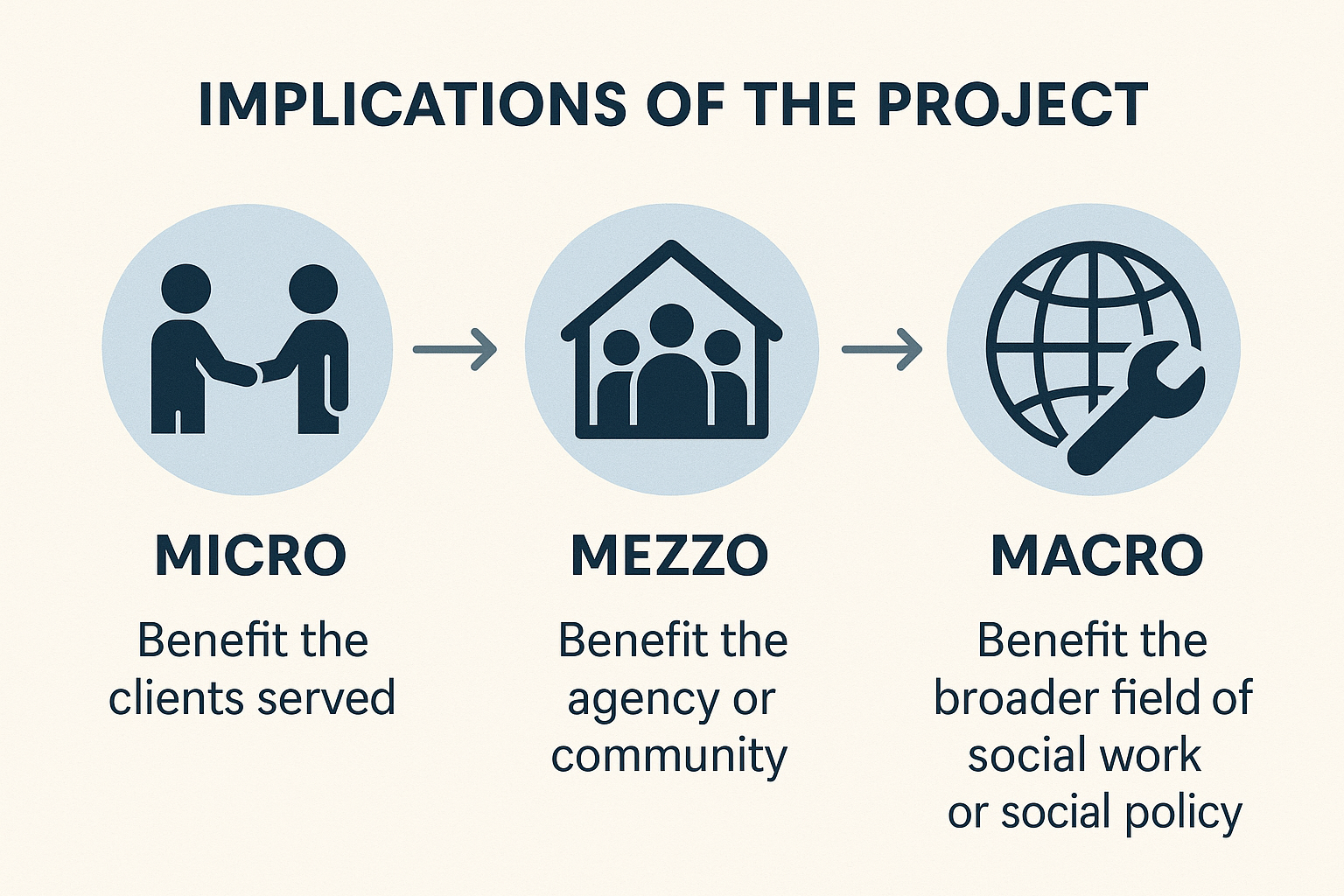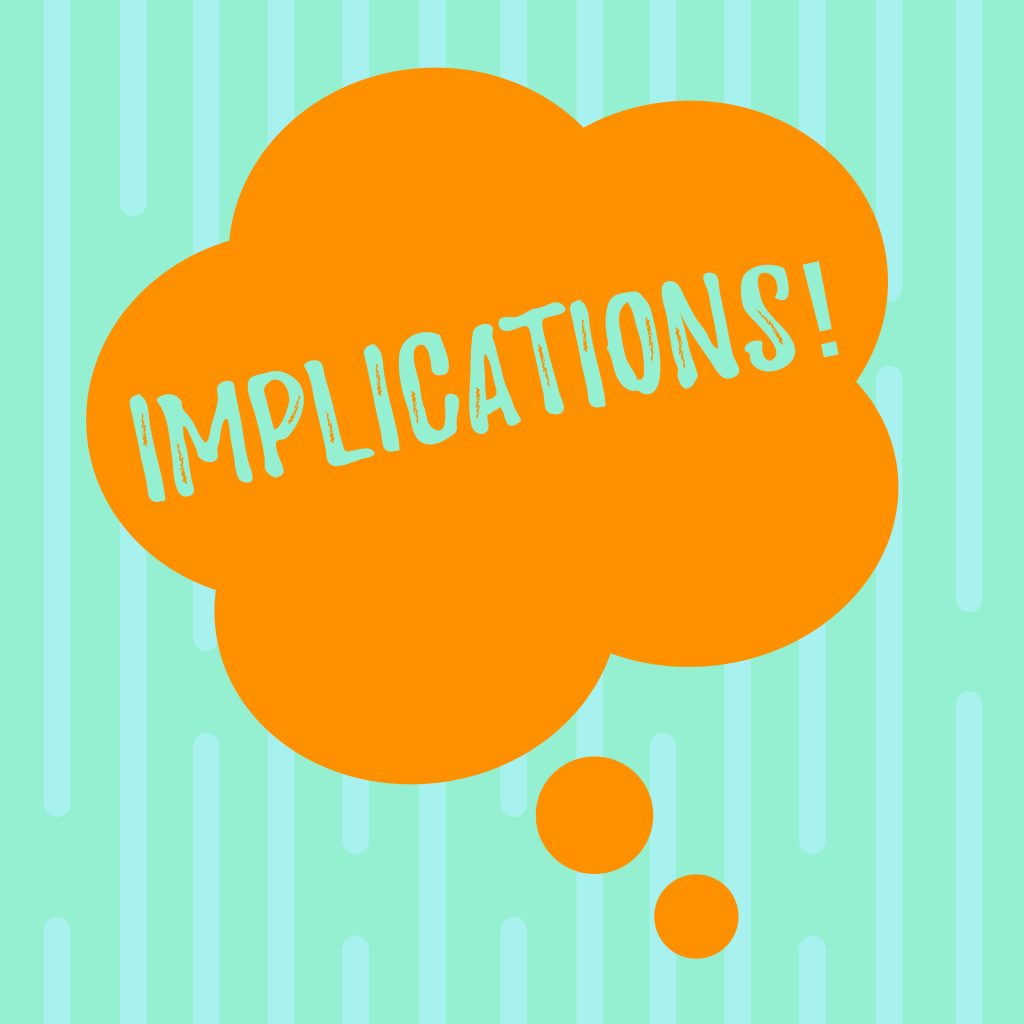6 Project Implications

You also want to be sure you are thinking about any possible limitations and/or obstacles that may be encountered during the implementation of your agency resources. Naming the limitations of our work isn’t a measure of good or bad, right or wrong, it simply provides transparency and allows others to contextualize their understanding of your work. As part of this analysis, include your ideas for how you will address or overcome these obstacles, if they arise.
Finally, in this section you want to consider the possible outcomes of your project, and the implications. The word “implications” has several synonyms in the English language, including hypothesis, expectations, hopes, dreams, and beliefs. Ask yourself: what are my hopes, dreams, and expectations for this project? Or try completing this prompt: if this project is developed and implemented as outlined here, I believe that the outcome will be ____________. Consider the implications of your project at the micro, mezzo, and macro levels. How will your project benefit the clients served (micro)? The agency or community (mezzo)? And the broader field of social work or social policy (macro)?

Implications may be theoretical, practical, methodological or policy oriented. Theoretical implications connect back to existing theories and models. For example findings from an evaluation project on youth engagement in social movements might support, challenge or extend extant theory on youth development and movement building. Practical implications, on the other hand, are concerned with the application of the project to real world settings. Methodological implications refer to innovations within our approach that might be employed in future projects. Finally, policy implications may indicate the need for new policy approaches or changes to existing policies.
See below for examples of the Discussion & Implications section from a couple of Capstone Proposals. Note though that these examples, while strong, may not fully address all of the key components of this section.
Public Education Campaign Example
“The two main problems the project addresses are AllHealth’s lack of brand awareness and Colorado’s problem of high addiction rates. In a survey conducted in the community, only 2% had an unaided awareness of AllHealth Network, 10% had an aided awareness (AllHealth, 2022). All other major mental health centers in the Denver Metro Area had higher awareness metrics. This project will increase brand awareness, especially among the populations that can get the most benefits from AllHealth’s various programs. Also, The Substance Abuse and Mental Health Service Administration say that the U.S is in a prescription drug and illicit opioid crisis (SAHMSA, 2022). Colorado, as of 2018, pre-pandemic, 11.9% of people 18 and older had a substance use disorder, compared to the 7.7% national rate (Colorado Health Institute, 2020). Many believe that this problem has only increased during the COVID-19 pandemic. With this project, I hope to help the community give relief to those with substance use disorders. Helping people obtain sobriety not only helps the individuals, but their loved ones, and the community. I also hope it will aid in Colorado’s efforts to decrease the rising trend of substance use disorders.”
Social Documentary Example
Questions for your reflection

- Has the writer summarized the project effectively?
- Have they briefly restated the project’s connections to theory and research?
- Is there a clear argument about the importance of the project to the agency, community or social work profession?
- Have they identified the potential impact of the project at the micro-, mezzo- and macro-levels?
- Do they name potential limitations of the project and discuss how they might navigate these challenges?
That’s a Wrap
This guidebook has walked you through the messy process of designing your graduate capstone project in social work. We’ve established a clear and focused purpose that is grounded in agency context, theory and research, and social work values and ethics. We’ve developed a sound plan for implementing your project that attends to agency constraints, logistical needs, cultural and ethical considerations, and your own, unique positionality. And, we’ve carefully considered the likely final product of your capstone project and it’s implications for micro-, mezzo-, and macro- social work practice. Now, it’s time to take breathe and celebrate your hard work! Next semester, we’ll get down to implementation, moving from concept to real-world. Til then, take a moment to pat yourself on the back. You deserve it!
